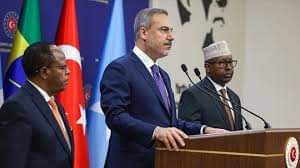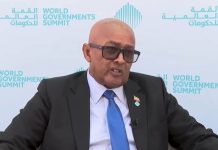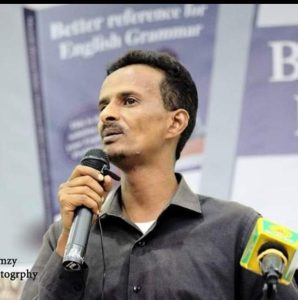The foreign ministers of Somalia and Ethiopia are scheduled to meet in Ankara next week to discuss the ongoing conflict arising from the agreement between Ethiopia and Somaliland earlier this year. The talks, which are being mediated by Turkey, aim to de-escalate the tensions that have brought the two nations to the brink of armed conflict.
According to Turkish Foreign Minister Hakan Fidan, the upcoming discussions will focus on a two-pronged framework settlement proposal. The proposal includes granting landlocked Ethiopia access to the sea via Somalia in exchange for Ethiopia’s recognition of Somalia’s territorial integrity and political sovereignty. “The tension between Somalia and Ethiopia will end if Ethiopia gains access to the sea, and if Ethiopia acknowledges the territorial integrity and political independence of Somalia,” Fidan stated during a press conference in Istanbul on Friday.
Fidan’s announcement follows his recent visit to Addis Ababa, where he held talks with Ethiopian Prime Minister Abiy Ahmed and Foreign Minister Taye Atske Selassie. During the visit, Fidan discussed the key aspects of the proposal in detail, emphasizing the importance of finding a peaceful resolution to the conflict.
Interestingly, Ethiopia has remained notably silent in response to Fidan’s public remarks about the proposed settlement. This silence raises questions about Ethiopia’s stance on the Turkish mediation efforts and the broader implications of the deal. There are several potential reasons for Ethiopia’s reticence:
1. Diplomatic Calculations: Ethiopia may be cautious about openly endorsing or rejecting the Turkish proposal. By maintaining silence, Addis Ababa could be leaving room for negotiation and avoiding any premature commitments that could complicate its diplomatic relations with both Somalia and Turkey.
2. Internal Considerations: Ethiopia is likely weighing its domestic and regional interests, particularly about Somaliland. Publicly acknowledging the proposal could have internal political ramifications, especially if there are factions within Ethiopia that oppose any compromise on the issue of sea access or recognition of Somaliland.
3. Strategic Patience: Ethiopia’s silence could also be a strategic move to observe how the situation unfolds, allowing it to gauge reactions from other regional players, including Somalia and Somaliland, before making a definitive statement. This approach may enable Ethiopia to adjust its position based on the evolving dynamics of the negotiations.
The situation between Ethiopia and Somalia deteriorated in January after Ethiopia and Somaliland, a breakaway region of Somalia, signed a controversial agreement. The deal, which grants Ethiopia access to the Red Sea in exchange for recognizing Somaliland, was rejected by Somalia as a violation of its sovereignty and a potential cause for war.
Turkey, which has taken on the role of mediator, is working to facilitate dialogue between the two nations. The first round of direct talks between Ethiopia and Somalia took place in Ankara in early July, with both sides agreeing to reconvene in September for further discussions.
In addition to brokering talks between Ethiopia and Somalia, Turkey has also been in contact with other regional countries that have close ties to both nations. “It doesn’t benefit any of us that these two countries have reached such a tense point due to misunderstandings and unresolved diplomatic issues,” Fidan said, highlighting the importance of regional cooperation in resolving the conflict.
Turkey’s involvement in the mediation process reflects its strategic interests in the Horn of Africa. Ankara has publicly supported Somalia’s territorial integrity and maintains close military and commercial ties with Ethiopia and Somalia. Turkey’s largest military base abroad is located in Somalia, and Ethiopia has recently purchased more than a dozen drones from Turkey.
As the second round of talks approaches, the international community will be watching closely to see whether Turkey’s mediation efforts can lead to a peaceful resolution of the conflict between Ethiopia and Somalia. Ethiopia’s silence on Fidan’s remarks adds an additional layer of uncertainty to the situation, as it remains to be seen how Addis Ababa will ultimately respond to the proposed settlement and whether this silence signifies strategic deliberation or hesitancy in its approach to the negotiations.

Xigasho:Gulaid Idaan
Bandhige@gmail.com


































